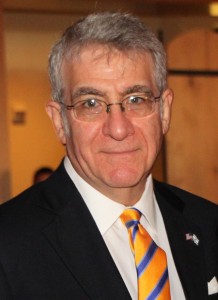AFTER READING WAR SCRIPT, DE PALMA THOUGHT AVRECH HAD RIGHT SENSIBILITY FOR WHAT BECAME 'BODY DOUBLE'

OpEdNews' Joan Brunwasser last week posted an interview with Robert Avrech, screenwriter of Brian De Palma's Body Double. Avrech discussed working with De Palma, and the screenplay he wrote about the Yom Kippur War that led to De Palma hiring him for Body Double.
"I was in Israel in 1973 during the Yom Kippur War," Avrech tells Brunwasser, "and I wrote a pretty powerful script about three women whose husbands were on the front lines. The script cut back and forth between fairly brutal scenes of war, and the more mundane, but tortured lives of the waiting wives. The structure was complex, but it read effortlessly, and the characters were quite vivid. I knew that this script was special. It was just a gut feeling that finally I had written something that was professional and entertaining.
"Writing a screenplay based on an idea by someone else, if the idea is solid, is just another corridor in the (futile) search to craft a flawless, air-tight narrative. What happens with me, and I suspect, all professional screenwriters, is a process of of internalization: The story becomes you.
"Brian De Palma came to me with a very general idea for Body Double. I immediately responded to its Hitchcockian theme of an innocent man drawn into a murder by a beautiful woman (Deborah Shelton), who then sets out to solve the mystery with the aid of a beautiful blonde (Melanie Griffith). Both Brian and I were, and are, huge fans of Alfred Hitchcock's movies. Together we screened Rear Window and Vertigo, and discussed the narrative strategies Hitch used in both films. So in a sense, I was working off of De Palma's ideas of Hitchcock's ideas."
Continuing with Brunwasser, Avrech notes, "One must also keep in mind that movies are a collaborative endeavor. The Hollywood screenwriter works alone only when he's at the keyboard. In truth, a professional screenwriter is always working with a studio/network, a line of producers, a director, and of course, when the film goes into production, his words then become the property of the actors. Obviously, the army of technicians who go into the making a multi-million dollar Hollywood production are vital: the cinematographer, the set designer, the costume designer, the prop people, etc.
"Another issue when working from someone else's idea is there are only 36 plots in the universe of narratives. Thus, every story is a reworking of an old myth or legend that we have seen and heard countless times. The trick is to reinvent these 36 stories in a manner that makes them feel new and original. So, in a very real sense, a screenwriter is always working from a classic idea. And in the end, it's really just one idea: because all great stories are... love stories.
"I was hugely intimidated by Brian De Palma... for about ten minutes. And then, as with all Hollywood celebrities with whom I have worked, he became just another homo sapiens, with all the virtues and flaws one finds in our species."
Updated: Monday, December 30, 2013 11:47 AM CST
Post Comment | Permalink | Share This Post



